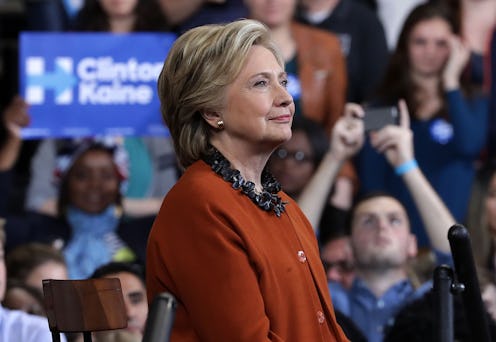News
The Double Standards In Clinton's Career Are Clear
On Friday afternoon, FBI Director James Comey announced an investigation into new Hillary Clinton emails. Based on multiple reports, it seems that the investigation will have little to do with Clinton; rather, it's focusing on disgraced former Congressman Anthony Weiner. And the way this whole investigation coverage has unfolded reveals a decades-long double standard that has plagued Clinton's career.
The FBI’s email didn’t say the case against Clinton had been reopened, but that didn’t stop the Republicans from using the line anyway. The press dutifully mimicked it — though they realized their error within a few hours and walked back the sensational takes. CNN’s Front Page had initially proclaimed, “FBI Reopens Clinton Email Probe,” yet only a few hours later had to change the story to “FBI Reviewing New Emails in Classified Information Probe.”
The rush to judgment could have serious consequences for the election. According to Nate Silver, if the blowback is similar to Comey’s remarks in June, it could increase Trump’s chances of winning 30 to 35 percent. In some ways, this is a story about a rush to judgment by the press. But, the bigger question is about bias and double standards.
In April, a study came out showing that Clinton had the most negative stories written about her of all presidential candidates, including Bernie Sanders, Donald Trump, Ted Cruz, and John Kasich. The converse was also true: Hillary also had fewer positive stories written about her. Why do so many in the press dislike her?
It’s a question that’s not a mystery to most professional women, many of whom wrestle with the same kinds of biases in our own careers. Studies repeatedly show that for women being successful comes at the expense of being liked. Women are also punished for showing emotion, particularly anger. Perhaps most frustrating of all, women also experience this bias from other women.
It’s worth revisiting how the press narrative about Clinton was set in the first place. When she became first lady, she made an offhand remark: “I suppose I could have stayed home and baked cookies and had teas, but what I decided to do was fulfill my profession which I entered before my husband was in public life.” What would be a very ordinary and reasonable statement today led to calling Clinton controversial. During an interview on 60 Minutes, Newt Gingrich’s mother called Clinton a bitch. In the '90s, the kind of women we were comfortable with were less like Clinton and more like Jenny McCarthy.
In 1996, Time columnist Joe Klein anonymously wrote the blockbuster novel Primary Colors. It’s a barely fictional take on Bill Clinton’s many sex scandals and subsequent battles with the press on the way to winning the 1992 nomination. While the book is an ultimately sympathetic look at Bill, Klein’s portrayal of Hillary is shrewish, loud, cold, and calculating. The most uncomfortable parts to reread in 2016 are the gratuitous sex scenes between Henry, his main character, and Susan, the character based on Clinton. Klein’s interpretation of Clinton isn’t just that she’s a political Machiavelli for standing by her husband, but as he indulges in a sexual, literary fantasy about her, he repeatedly describes her as “fortified,” “formal,” “distant,” and “stiff.” Ironically, given the events of this election with Trump, the sequel to Primary Colors spends a great deal of time debating the supposed dangers of believing women who allege sexual assault.
Klein’s unsympathetic interpretation of Clinton has been the one much of the press has run with for more than 20 years. When you re-watch clips of Clinton from the '90s to today, you can see the evolution in how openly she expresses emotion. With “I didn’t stay home and bake cookies,” Clinton spoke openly, the way male politicians do every day, yet the press crucified her for it. As a result, Clinton has been forced to become much more cautious in public, which just feeds the impression that she’s cold and distant.
Clinton faces the same Kobayashi Maru scenario that women in most fields face: No answers are correct. And for Clinton, as her emails are criminally obtained and thrown out to the coliseum of public judgment, she can’t even trust that her private thoughts will remain private.
To me, the most notable endorsement of Clinton didn’t come from any newspaper; it came from former New York Times editor Jill Abramson. “This may shock you: Hillary Clinton is fundamentally honest,” wrote Abramson, who has conducted countless investigations of Clinton over her career a journalist. Abramson went on:
For decades she’s been portrayed as a Lady Macbeth involved in nefarious plots, branded as ‘a congenital liar’ and accused of covering up her husband’s misconduct. Some of this is sexist caricature. Some is stoked by the ‘Hillary is a liar’ videos that flood Facebook feeds. Some of it she brings on herself by insisting on a perimeter or ‘zone of privacy’ that she protects too fiercely. It’s a natural impulse, given the level of scrutiny she’s attracted, more than any male politician I can think of.
Abramson goes on to write that her investigations have shown Hillary is who she presents herself to be. “It’s fair to expect more transparency,” says Abramson. “But it’s a double standard to insist on her purity.”
Images: Allison Gore/Bustle (1); Tina Gong/Bustle (1); Dawn Foster/Bustle (1)
